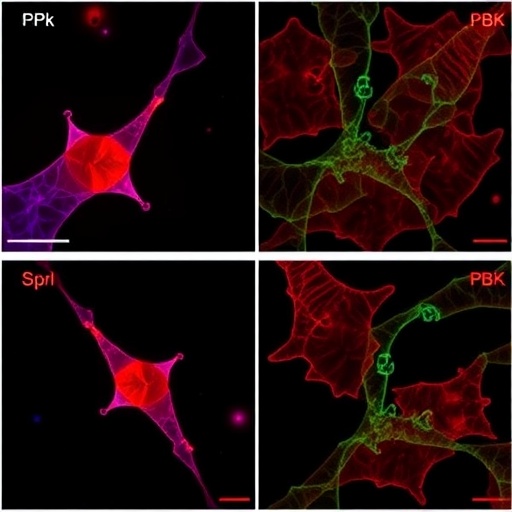In a groundbreaking study set to reshape our understanding of muscle regeneration, researchers led by D. Wang, D. Shan, and D. Zhao have unveiled compelling evidence indicating that Pbk, a protein implicated in cell signaling pathways, plays a crucial role in myoblast differentiation and muscle healing. Their research, published in the Journal of Translational Medicine, elucidates a novel mechanism whereby Pbk enhances autophagy through the activation of the AMPK/ULK1 signaling pathway, providing new insights into therapeutic strategies for muscle-related disorders.
The mechanism of muscle regeneration is multifaceted, involving an intricate interplay of cellular processes that govern muscle growth and repair. Myoblasts, the progenitor cells that differentiate into muscle fibers, are central to this process. These cells must transition from a quiescent state to a highly active form to facilitate muscle repair after injury. The present study highlights how Pbk serves as a positive regulator in this transition, suggesting new avenues for research into muscle regeneration processes.
Autophagy, the cellular degradation and recycling process, has emerged as a critical component of tissue homeostasis. During muscle regeneration, autophagy plays a dual role by providing energy substrates through the breakdown of damaged organelles while also clearing cellular debris. Wang and colleagues’ findings reveal that the upregulation of Pbk enhances autophagic processes specifically through its interaction with the AMPK/ULK1 signaling pathway. This interaction is pivotal, as it triggers a cascade of events that promote myoblast differentiation.
The activation of AMPK is a crucial factor in cellular energy homeostasis, particularly in response to stress. In the context of myoblast biology, the activation of AMPK leads to the phosphorylation of ULK1, a key initiator of autophagy. Wang and his team have demonstrated that increased Pbk levels amplify this pathway, thereby enhancing the myogenic shift necessary for repair. This study posits a direct link between signal transduction through Pbk, cellular energy status as dictated by AMPK, and the subsequent activation of autophagy-related pathways.
Furthermore, the implications of Pbk’s role extend beyond muscle regeneration; they touch on broader aspects of muscle health. Muscle wasting conditions, which can arise from age, illness, or disuse, present substantial health challenges. By enhancing our understanding of proteins like Pbk, potential interventions can be developed to mitigate muscle degeneration, providing hope for patients suffering from chronic muscle atrophy or injury.
In light of increasing global aging populations, the urgency for innovative solutions to combat muscle-wasting disorders has never been higher. With the rising prevalence of sarcopenia—a condition characterized by loss of muscle mass and function—further elucidating the molecular mechanisms underlying muscle regeneration is essential. The findings by Wang et al. suggest that modulating Pbk expression could serve as a viable therapeutic strategy to enhance muscle regeneration and combat age-related muscular decline.
The research also brings to light the potential of using pharmacological agents to target the Pbk-AMPK-ULK1 axis. Experience with compounds that stimulate AMPK activity could be harnessed to promote myoblast differentiation and muscle regeneration indirectly via the enhancement of autophagic processes. Such pharmacological strategies could pave the way for novel therapeutic approaches in treating both congenital and acquired muscle disorders.
Additionally, the study underscores the importance of conducting in vivo experiments to corroborate the in vitro findings regarding Pbk’s role in muscle regeneration. Understanding how Pbk influences muscle repair in living organisms could provide a more comprehensive picture of its functionalities. Animal models may yield critical insights into the timing and regulation of Pbk during various phases of muscle repair, ultimately leading to enhanced therapeutic strategies in clinical settings.
Despite the promising nature of these findings, challenges remain in translating this knowledge into clinical practice. For instance, targeting Pbk in human patients requires a nuanced understanding of its broader biological roles. Researchers must navigate the complexities of systemic signaling pathways to avoid unintended consequences. It is essential for future research to evaluate the safety and efficacy of potential interventions aimed at manipulating Pbk levels to optimize muscle regeneration.
The study’s findings have ignited interest across multiple fields, from regenerative medicine to sports science. Athletes and coaches are eagerly examining the potential benefits of optimizing muscle recovery through enhanced autophagy processes. Improved performance and quicker recovery times are highly sought after in competitive sports, and understanding how Pbk influences these mechanisms could provide a tactical advantage.
In summary, the work by Wang and colleagues represents a significant advancement in our understanding of muscle biology at the molecular level. The discovery that Pbk is a positive regulator of myoblast differentiation through the AMPK/ULK1 mediated autophagy offers exciting possibilities for future research. By further investigating the molecular underpinnings of muscle regeneration, scientists can develop more effective treatments for a variety of muscle-related ailments.
As muscle regeneration continues to capture the attention of the scientific community, Wang et al.’s research is likely to spur further inquiries into the roles of various modulators in this crucial process, ultimately leading to refined therapies that restore muscle function in populations affected by muscular diseases. The profound implications of this work extend beyond just understanding myoblast biology; they may very well lead to transformative approaches in regenerative medicine. The path forward rests upon ongoing studies and trials that harness these biological insights for a healthier future.
Subject of Research: Myoblast differentiation and muscle regeneration via Pbk regulation
Article Title: Pbk positively regulates myoblast differentiation and muscle regeneration via enhancing AMPK/ULK1 mediated myogenic autophagy
Article References: Wang, D., Shan, D., Zhao, D. et al. Pbk positively regulates myoblast differentiation and muscle regeneration via enhancing AMPK/ULK1 mediated myogenic autophagy. J Transl Med 23, 1144 (2025). https://doi.org/10.1186/s12967-025-07173-z
Image Credits: AI Generated
DOI:
Keywords: Myoblast differentiation, muscle regeneration, Pbk, autophagy, AMPK, ULK1, regenerative medicine, muscle health, myogenic biology.




